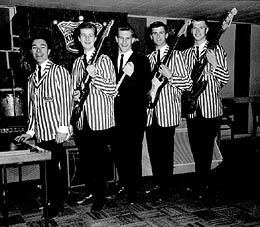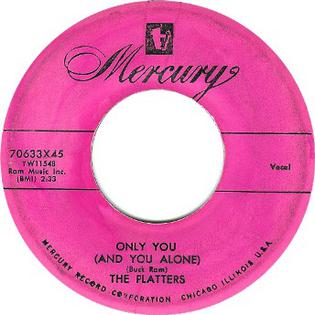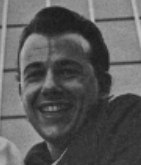Related Research Articles

The Righteous Brothers are an American musical duo originally formed by Bill Medley and Bobby Hatfield but now comprising Medley and Bucky Heard. Medley formed the group with Hatfield in 1963. They had first performed together in 1962 in the Los Angeles area as part of a five-member group called the Paramours, and adopted the name The Righteous Brothers when they became a duo. Their most active recording period was in the 1960s and '70s, and, after several years inactive as a duo, Hatfield and Medley reunited in 1981 and continued to perform until Hatfield's death in 2003. The term "blue-eyed soul" is thought to have first been coined by Philadelphia radio DJ Georgie Woods in 1964 when describing the duo's music.

The Kingsmen are a 1960s American rock band from Portland, Oregon. They are best known for their 1963 recording of R&B singer Richard Berry's "Louie Louie", which held the No. 2 spot on the Billboard charts for six weeks and has become an enduring classic.

Robert Lee Hatfield was an American singer. He and Bill Medley were the Righteous Brothers. He sang the tenor part for the duo and sang solo on the group's 1965 recording of "Unchained Melody".
"Unchained Melody" is a 1955 song with music by Alex North and lyrics by Hy Zaret. North wrote the music as a theme for the prison film Unchained (1955), hence the song title. Todd Duncan sang the vocals for the film soundtrack. It has since become a standard and one of the most recorded songs of the 20th century, most notably by the Righteous Brothers in 1965. According to the song's publishing administrator, over 1,500 recordings of "Unchained Melody" have been made by more than 670 artists, in multiple languages.

"Only You (And You Alone)" (often shortened to "Only You") is a pop song composed by Buck Ram. It was originally recorded by The Platters with lead vocals by Tony Williams in 1955.
"Ebb Tide" is a popular song written in 1953 by the lyricist Carl Sigman and composer and harpist Robert Maxwell. The first version was sung by Vic Damone backed by Richard Hayman's orchestra. The highest-selling version was released by the Righteous Brothers in 1965.

"You've Lost That Lovin' Feelin'" is a song by Phil Spector, Barry Mann, and Cynthia Weil, first recorded in 1964 by the American vocal duo the Righteous Brothers. This version, produced by Spector, is cited by some music critics as the ultimate expression and illustration of his Wall of Sound recording technique. The record was a critical and commercial success on its release, reaching number one in early February 1965 in both the United States and the United Kingdom. The single ranked No. 5 in Billboard's year-end Top 100 of 1965 Hot 100 hits – based on combined airplay and sales, and not including three charted weeks in December 1964 – and has entered the UK Top Ten on three occasions.

William Thomas Medley is an American singer best known as one-half of The Righteous Brothers. He is noted for his bass-baritone voice, exemplified in songs such as "You've Lost That Lovin' Feelin'". Medley produced a number of the duo's songs, including "Unchained Melody" and "(You're My) Soul and Inspiration".
"Tell Me Why" is a popular song written by Marty Gold with the lyrics by Al Alberts. The song was published in 1951.

"I Won't Last a Day Without You" is a song by The Carpenters with lyrics written by Paul Williams and music composed by Roger Nichols. The writing duo had previously contributed "We've Only Just Begun" and "Rainy Days and Mondays" to the Carpenters.

"(You're My) Soul and Inspiration" is a song by the American pop duo the Righteous Brothers. It was the group's first hit after leaving their long-time producer Phil Spector. The song was written by Barry Mann and Cynthia Weil, who also wrote the group's first hit "You've Lost That Lovin' Feelin'" along with Phil Spector. It is the title track of their album. The single peaked at No. 1 on the US Billboard Hot 100, and reached No. 15 on the UK Singles Chart. Billboard ranked the record as the No. 3 single for 1966.
The Del-Vetts were an American garage rock band formed in Chicago, Illinois, in 1963. They released five singles and obtained regional success in the Midwest.

"I'll Try Something New" is a song written by Smokey Robinson and originally released in 1962 by The Miracles on Motown Records' Tamla subsidiary label. Their version was a Billboard Top 40 hit, peaking at #39, and just missed the Top 10 of its R&B chart, peaking at #11. The song was released later as a joint single by Diana Ross & the Supremes and The Temptations, also becoming a charting version on the Billboard 100 pop singles chart, peaking for two weeks in April 1969 at number 25.
"Come On Do the Jerk" was a 1964 song recorded by R&B group the Miracles on Motown Records' Tamla label subsidiary. It was co-written by Miracles members Pete Moore, Bobby Rogers and Smokey Robinson and drummer Donald Whited. A single-only release, it did not appear on any original Miracles studio album, and was the group's last single release of 1964. Robinson and fellow Miracle Bobby Rogers were the song's producers. The flip side, "Baby Don't You Go", was also a popular regional hit but was not released on CD until The 35th Anniversary Collection in 1994. Both sides of this single received new stereo mixes for the 2002 compilation Ooo Baby Baby: The Anthology.
"Dream On" is a song written by Dennis Lambert and Brian Potter. In 1974, The Righteous Brothers had a hit version, reaching No. 32 on the Billboard Hot 100, and No. 6 on the U.S. and Canadian Adult Contemporary charts. Bill Medley and Bobby Hatfield alternate lead vocals.

"Rock and Roll Heaven" is a song written by Alan O'Day and Johnny Stevenson, popularized by The Righteous Brothers. It is a paean to several deceased singers such as Jimi Hendrix, Janis Joplin, and Otis Redding, and has been rewritten a number of times to include other singers. The song was first recorded by the band Climax in 1973, but it failed to chart. It was then covered by The Righteous Brothers in 1974 and reached number three on the U.S. Billboard Hot 100.

"Cry Like a Baby" is a 1968 song written by Dan Penn and Spooner Oldham, and performed by The Box Tops. The song reached No.2 in April 1968 on the Billboard Hot 100 chart, a position it held for two weeks. It was kept out of the top spot by Bobby Goldsboro's "Honey", which stayed at No.1 for five weeks. "Cry Like a Baby" also reached No.2 on Cashbox for one week. It stayed on the Hot 100 for 15 weeks and Cashbox for 14 weeks. It was awarded a gold disc for selling over one million copies in the United States.
Bill Haley & His Comets recorded many singles and albums. The following list references only their original release and generally does not include compilation albums or single reissues. This list does not include releases on which the Comets worked as session musicians, and primarily focuses on releases during Haley's lifetime.

The Kingsmen Volume II is the second album by the rock band The Kingsmen, released in 1964.

Jimmy Walker was an American musician and singer who was the drummer for one-hit wonder band The Knickerbockers and the replacement for Bill Medley in the Righteous Brothers, following his 1968 departure.
References
- 1 2 Marsh, Dave (1989). The Heart of Rock & Soul: The 1001 Greatest Singles Ever Made. Plume. p. 298. ISBN 0-452-26305-0.
- ↑ "Little Latin Lupe Lu/I'm So Lonely". Discogs. 1962. Retrieved 3 May 2020.
- ↑ "Little Latin Lupe Lu". Second Hand Songs. Retrieved 3 May 2020.
- ↑ "Little Latin Lupe Lu". Brucebase. Retrieved 3 May 2020.
- ↑ Medley, Bill (2014). The Time of My Life: A Righteous Brother's Memoir. Da Capo Press. pp. 12–32. ISBN 9780306823169 . Retrieved 3 May 2020.
- ↑ "Little Latin Lupe Lu". Song Facts. Retrieved 3 May 2020.
- ↑ McGinnis, Ray (8 January 2020). "Little Latin Lupe Lu by the Righteous Brothers". Vancouver Pop Music. Retrieved 3 May 2020.
- ↑ "CashBox Record Reviews" (PDF). Cash Box. April 27, 1963. p. 10. Retrieved 2022-01-12.
- ↑ "WDGY: January 23, 1965". oldiesloon.com.
- ↑ Chicago Top 40 Charts 1960-1969, compiled by Ronald P. Smith, Writers Club Press, ISBN 0-595-19614-4
- ↑ Whitburn, Joel (2013). Joel Whitburn's Top Pop Singles, 14th Edition: 1955-2012. Record Research. p. 733.